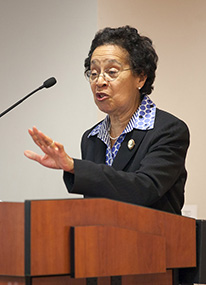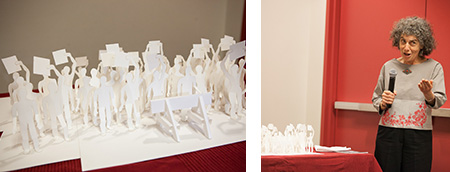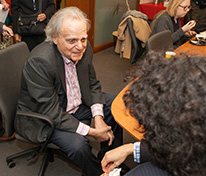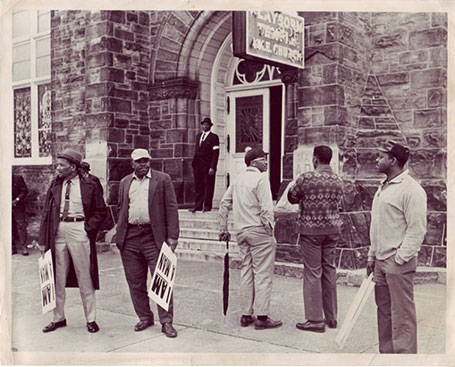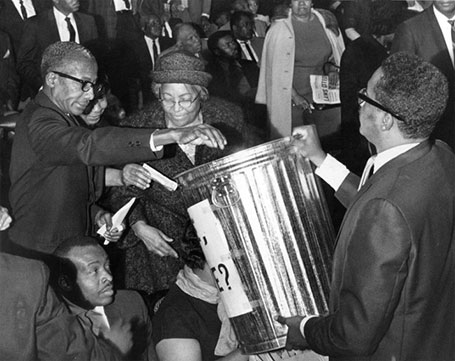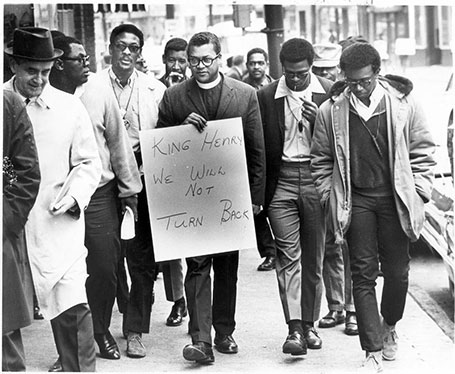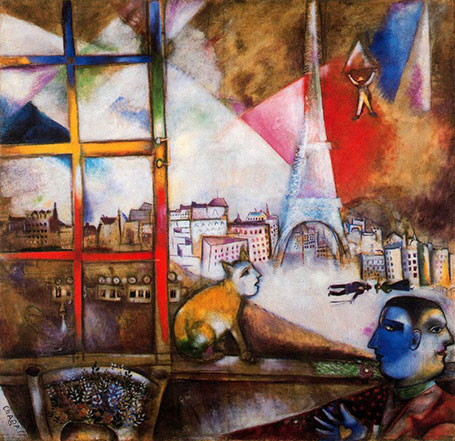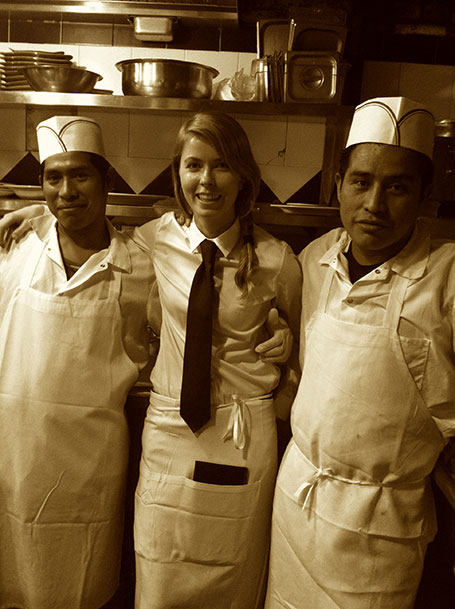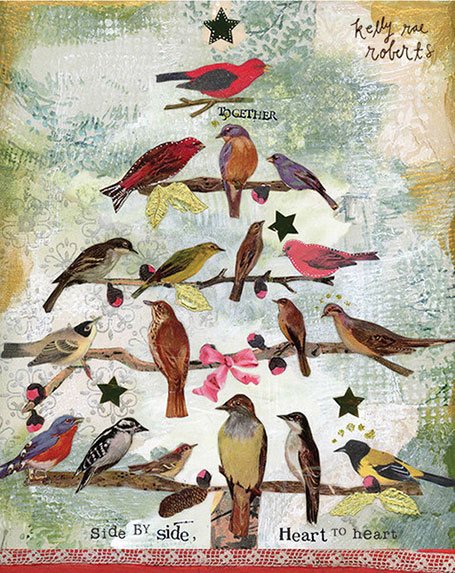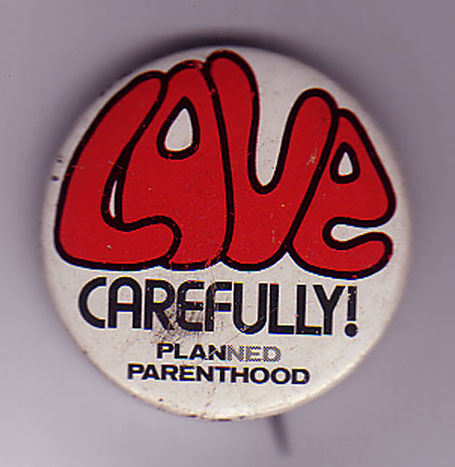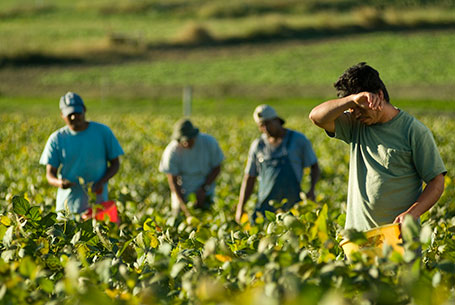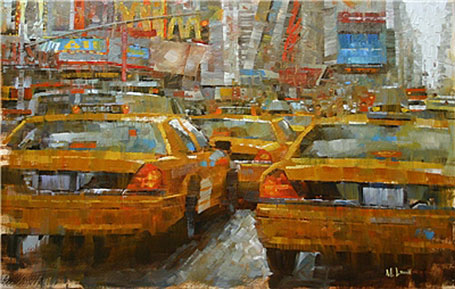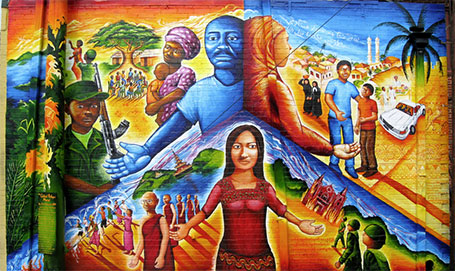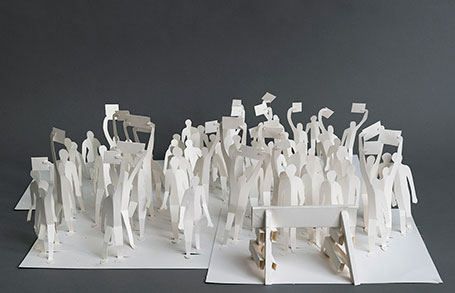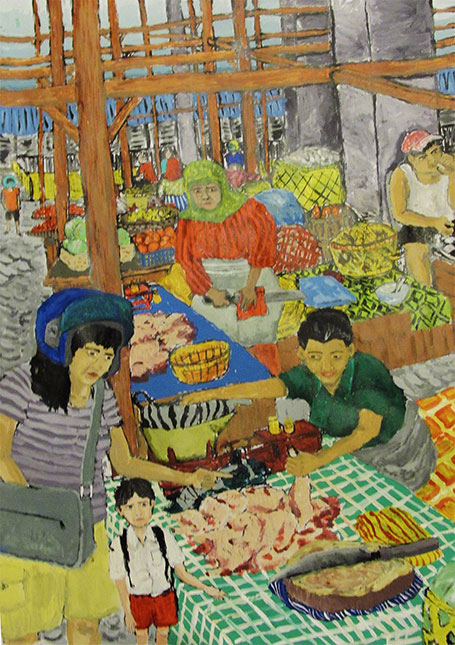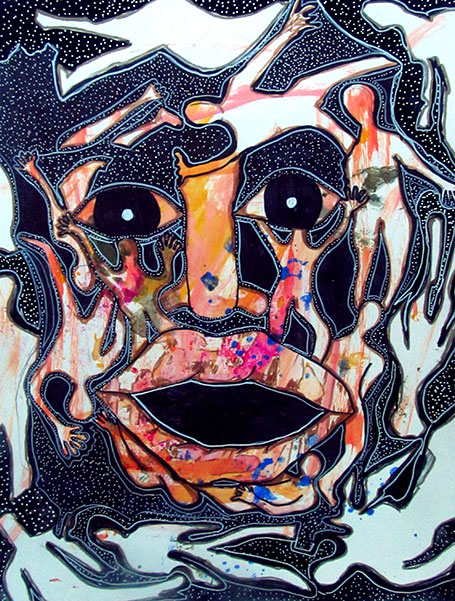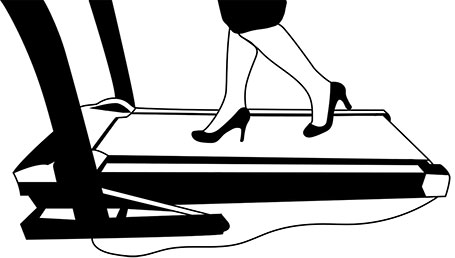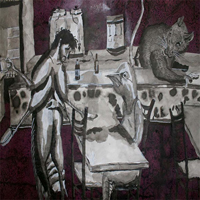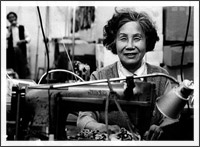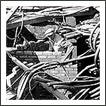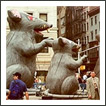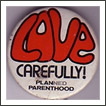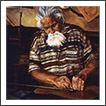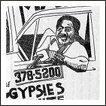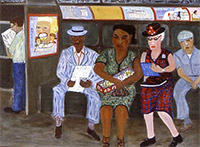First Prize, Fiction
Chris Bonfiglio History/English, Queens College
Il Sole e la Luna
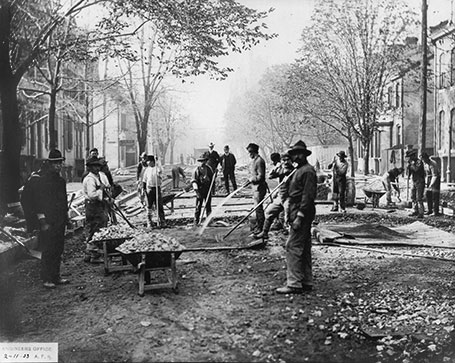 Italian immigrant workers constructing a sewer, photographer unknown, 02/11/1903
Italian immigrant workers constructing a sewer, photographer unknown, 02/11/1903
New York, 1905
They emerged as one from the ferry and proceeded along the dock, their work boots leaving flecks of dust in their wake as their stomping released some small measure of the dizzying amount of dried mud that had accumulated there from, not just the previous work day, but from many previous days of back breaking labor. The rest of their attire fared no better; it was a sea of trousers and shirts and jackets all tinted in an almost yellowish hue thanks to the endless sea of muck that they came to swim in once more.
For some, their faces and hands matched their clothing as sleep found them before the urge to clean up did. For the others, their hands and faces were the only clean things about them. Although, clean was subjective in their world. Traces of dirt could still be found under their nails and in their hair as a quick scrubbing of hands and dousing of faces was a poor substitute for a bath. The rest of their bodies were lost causes since their clothing offered little protection against an enemy that seemed to make a game out of slipping through their collars, sliding up their sleeves, and attacking any hole or breach in the worn fabric that they put on day after day.
The weekend was fast approaching and some intended to head over to a bathhouse near the Hudson to rid themselves of the grime if only for a day. Others would wait far longer to shed their second skin.
As they approached their work site, they were greeted by more of their disheveled compatriots who had arrived by trolley or train. Among the group was a steely eyed man who was closer to five feet tall than six. His true visage was only partially visible. Dirt still held tight to his neck and ear region, but he had combated it somewhat by repeatedly cupping his calloused hands in water and bringing them up only to the center of his face. It had the effect of creating an almost trademark oval shape where his skin had been reclaimed from the dirt.
“Vincent, over here,” a voice called out to the man in Italian.
“Roberto. Good to see you, my friend,” he replied, also in Italian.
The two men made their way through the crowd to formally greet one another with a firm handshake and a pat on the back. Roberto was a good head taller than Vincent and quite a bit more robust. They made an odd looking pair as they continued, side by side, on their way and were shortly thereafter handed heavy stones out of a horse drawn wagon that they in turn handed off to a succession of other workers. Slowly, the stones made their way to the water’s edge where they were unceremoniously plopped down next to their previous day’s efforts. It was grueling work but it meant a break from the muck that would later need to be piled on top of the rocks and for that Vincent was grateful.
“I don’t know what you always complain about, this isn’t that bad at all. There’s sun on our faces and a cool salt water breeze to breathe in. I could get used to this.” declared Roberto.
“You’ve only been on the job for a few days. It get worse, trust me. And this time it’s rocks and dirt. Next time it may be garbage.”
“Spend a few days in a hole digging this stuff out so everyone here doesn’t have to rely on garbage as much and you’ll be changing your tune. I tell you, you don’t know how plum you have it. Besides, at least you’ve been doing some of significance. People need more land. They don’t need a subway when there are plenty of regular trains around.”
“Is this the part where you say you wasted three years of your life working on the 4th Avenue subway because it will be defunct after all this landfill work we’ve been doing pays off?”
“Have we had this conversation before?”
“Many times.”
“Oh, well, still you should be more cheery.”
“I’m just tired, my friend, and doing landfill work is not what I want out of life, you know?
“Have you talked to that baker friend of yours? The one in Greenpoint who you said might be willing to teach you his trade?”
“Not yet.”
“You should. A baker’s life would be perfect for one so delicate.”
Vincent stopped what he was doing to shoot Roberto an annoyed look, but Roberto quickly disarmed the tension with a hearty laugh.
“I joke with you but, truthfully, if that’s what you want you should get on it. You’re getting up there in age, you know,” Roberto added.
“I’m only twenty-seven.”
“Twenty-seven? I thought you were a good three years younger than that. I take it back, you’re a lost cause. Look at you, you’re not even married yet.” Roberto smiled through his mustache.
“There will be plenty of time to get married after…”
“Yes, yes, after you’ve established yourself as a baker. I’m not the only one who retells the same stories, my friend. Look, I know this girl who just came over and is living over on Goerck Street with my cousin. Nice girl. She’s from Sicily like you, twenty-two or twenty-three I think. I’ll introduce you.”
“What’s her name?”
“See, I knew that would get your attention. It’s Maria Rosa. Soon to be Maria Rosa Salerno, mark my words. Of course, you’ll have to clean yourself up. I don’t know if you realize this, but you’re filthy.”
“You’re one to talk.”
“I don’t know why we don’t just take a swim in the water over here when we’re done. It would make things so much easier.
“I told you last time, the bosses won’t allow it.” Vincent nods his head to a pair of figures supervising the latest wagon full of stones.
“Fine, fine. A bathhouse it is. Clean yourself up. We’ll head over there on Sunday. What do you say?”
“Maria Rose, you said?”
Roberto let out another of his famous hearty laughs and patted his friend on the back.
Arkansas, 1909
The sun was high in sky and merciless in its assault on the workers that toiled in the field below it. It had been a few years since they moved there, encouraged by promises of a better life as a sharecropper, but they were nowhere closer to growing accustomed to the conditions than they were when they first arrived.
Some of the workers chatted amongst themselves while they picked cotton to make the work go easier, others took a solitary, quiet approach to getting through the day. Among the second group was a burly fellow named Leonardo Mastropaolo. If he regretted moving his family from Louisiana to spend his time working to get out of the debt imposed upon by him by a landowner seeking an alternative form of slave labor, he did not show it. He went through life wearing an indelibly stoic expression in all matters, favoring simply to do his work without complaint and return to the home that he still owed over a decade of service to pay off.
Such aspirations were shattered on this day when a neighbor woman came running through the field screaming his name. He looked up, seemingly nonplussed, but he knew something was horribly wrong.
Several evenings later, as he sat with his five children, eating a meal that the same neighbor who came to fetch him kindly made for them, a well-dressed man sporting a frock coat came knocking on his door.
“Mr. Mastropaolo?” inquired the man.
“Yes. Who are you?”
“May I come in?”
Leonardo stood unmoving, giving the man one of his usual blank looks that to the uninitiated could be confused with a cold, death stare.
“My apologies. I am Mr. Baird. I represent the Corbin family. I have an important matter to discuss with you. Please, may I come in?”
Leonardo continued to stand in place, staring at the stranger for what the balding lawyer perceived as the longest moment in his life. He fidgeted with a button on his coat and audibly gulped, looking for something more to say when, suddenly, Leonardo stepped aside without a word, allowing the unnerved Mr. Baird entry.
“Do you mind if I have a seat?” asked Mr. Baird as he motioned to a shaky bench in the corner.
“What do you want?”
“My clients are deeply regretful for the automobile accident involving your wife. It is terrible business. Especially what with you now left alone to care for children.” Mr. Baird glances over to the five faces staring back at him from the dinner table. “Yes, well, you see, my clients know how difficult this must be on you and so they would like to offer you a hundred dollars to make sure you and yours are taken care of.”
Leonardo glances down as Mr. Baird produces an envelope from his pocket and presents it to him.
“Go on take it now and let’s put this nasty business behind us.”
For a moment it seems as if Leonardo has no intention of moving, but after taking a deep breath he reaches out to take hold of the envelope and then shuffles off to his bedroom without a word uttered or any effort made to usher Mr. Baird out the door. Lifting a silken handkerchief from his pocket, the lawyer uses it to pat his sweaty forehead and then looks over at the five eerie faces once more before lettering himself out.
“Did you see that, Ciro? I don’t think I’ve ever seen papà that emotional before,” uttered one of the two boys.
“Eat your food, Frankie,” replied his older brother.
With that they and their three sisters turned their attention back to their dishes and ate in utter silence.
New York, 1912
“Vincent! Hurry!” Maria yelled out the window in Italian.
Vincent came running up to the front door of their apartment building in Greenpoint and stopped to look up at his wife. “What’s wrong? Did something happen to the baby?”
“No. It’s Joanna, I can’t find her anywhere. Someone took her, I know it.”
“It’s going to be okay…”
“It’s not going to go be okay. It’s that boy all over again,” she cried in reference to a kidnapped child who had just recently been found in a basement four buildings down. Pregnant with their fourth child, hearing what happened to that boy shook Maria deeply, both because it was so close to home and because it was only the latest in a growing trend that made her fear for her children’s safety.
“Hold on, I’m coming up,” an exaggerated Vincent yelled up to her.
Rushing up two flights of stairs and bursting through his apartment door he was greeted first by his oldest daughter, five year old Rosalia. “What happened?” he asked of her.
“Me, Joanna, and Francesca were playing and then I don’t know daddy. I don’t know. I don’t know.”
Maria appeared behind their daughter, a frantic look on her face.
“It’s okay Rosalia. Go to your room.” Turning to his wife, Vincent asked, “When did this happen? Were they outside?”
“No, no. They were in the apartment. I was making dinner and Rosalia came and told me Joanna was missing.”
“Well did you hear the door open or…”
“No, nothing. It’s been an hour, I just know something terrible happened. We looked in the apartment, we looked up and down the street. I just came back to see if she returned home and then you showed up. I don’t know what to do.”
“Did you knock on doors and ask if anyone in the building saw her.”
“No. I didn’t have time. I thought she was outside and I just got back.”
“It’s okay. Just sit down. You’re pregnant. You need to sit. I will go ask around. You wait here in case she comes back.” Vincent fixed her with a look that shut down any argument and ran out the door.
After he can been gone for over an half hour, Rosalia appeared in the doorway with her two younger sisters in tow.
Flabbergasted, relieved, angered, and so much more all at once, Maria got up and embraced her daughter.

“If she was hiding under the bed, why didn’t she come out when you called her?” Vincent asked his wife after returning home later that evening.
“She said she was afraid that she’d be in trouble once she realized how upset I was. I was so sure the worst happened, Vincent. I can’t take this neighborhood, it’s killing me.”
“Everything is fine. She was safe, don’t worry.”
“It’s not fine. She was safe this time, but something bad is going to happen. It’s only a matter of time.”
“What do you want do? Do you want to move to another neighborhood?”
“No, not another neighborhood. I think we should go to Marineo. It will be safer there and you can be with your father. You told me you were worried for him since he took ill.”
“Maria, my love, you’re six months pregnant. Plus, what about the bakery? Al just made me a partner. We can have a good life here.”
“You can run the run general store for your father. We can have a good life there. Think about it, please.”
For Vincent, leaving everything and everyone he knew to come to United States seemed like the hardest thing he would ever have to do. The thought of going back after all that he went through seemed like giving up. But as he thought more on it, he came to see that maybe coming to a find a life for himself wasn’t about the place he lived in but the people he lived with. Two months later, they packed up everything they had and returned to Sicily.
Arkansas, 1921
“It’s time, Frankie.”
“How long do you think it will be, Ciro?”
“I don’t know. A few months, a year maybe. I’ll send for you all as soon as I earn enough money to. In the meantime, take care of your sister.”
“I will.”
They looked each over and shook hands before Ciro walked out the door. In many ways, it had been just the two of them for so long. Their youngest sister largely kept to herself, and their two older sisters were married to older men when they turned fifteen because their father was unable to care for all of them by himself. The man himself was distant, although understandably so to the two brothers since he had to both work and care for them. Seven years the senior of a now sixteen, almost seventeen year old Frankie, Ciro in many ways took on a fatherly role in his brother’s life. That was true more now than ever as he set off to Brooklyn in search of a better life for all of them.
New York, 1939
Joanna sat at the counter of her parent’s bakery, alternating between chatting with her cousin, reading from her copy of Jean Val Jean, and serving customers when a salesman walked in.
“How many more days do you need to work to have enough?” Jimmy asked his cousin.
“Not much. A few more months and I’ll be set,” Joanna replied.
“What are you going to get, a Chrysler?”
“Uh huh. I just need to learn to drive now,” Joanna said with a laugh.
“Excuse, my name is Frank Mastropaolo and I don’t mean to interrupt, but is there someone here who I can speak to about your coal situation? Whatever the owner is paying now, I’m sure I can offer you a better deal.”
“I’m sorry, no. My parents are not in right now.”
“Fine, fine. Here’s my card. I’ll be back around in about a week and, you know, if you want to learn to drive I can always give you lessons.”
At that moment a customer approached the counter and Joanna moved to help her.
“Well?” inquired Frankie.
“Huh? Oh, sure.”
“Okay great, see you next week,” Frankie said before exiting the store with a big smile on his face.

“Hi again,” Frankie smiled brightly at Joanna when next he visited the bakery.
“Can I get you anything?”
“Actually, I was wondering if the owners are in and would be willing to discuss their coal supply and if after that you want to go for your lesson.”
“Lesson? What lesson?”
“Your driving lesson, of course.”
“Oh, yes, you did mention that…”

“So how long have you lived here?” Frank asked from the passenger seat as the two pulled out of a parking spot during their fourth lesson together.
“In Corona or New York?”
“Both, I guess.”
“Oh well, we moved here from Marineo in ’23, but I lived in New York until I was four.”
“So your parents immigrated here and moved back to Italy? How’d that happen?”
“My grandfather was sick and so my father moved us back there to take care of him.”
“And then you all moved back after he died?”
“No, he died before that. Things were hard after the war and so my parents decided to come back. They started the business in ’31 and I take care of orders and the books for them.”
“That’s neat. I’m planning to start a business of my own, you know.”
“Oh?”
“It’s going to be a coal/oil delivery business. My brother Ciro—he repairs watches—is going to help.”
The two chatted for some time more. Joanna talked about how her father was drafted into the Italian military and fought in Northern Africa in The Greater War. Frank talked about his own father who suffered from hardening of the arteries and couldn’t work since moving to New York, but was cared for him and his brother. The conversations continued over many more lessons and many more dates, leading to a walk down the aisle and their first daughter two years after that.
Joanna never did to buy that Chrysler, but she did use her car money to help her husband buy his first oil delivery truck. From there the business took off, serving the Queens neighborhood of Woodside and the surrounding areas for decades to come. They had their own stumbles and their own setbacks, but they pushed through them and came out of those experiences all the stronger, as did their children and their children’s children.
